Rolling jumped up—his nostrils dilated and a vein stood out sharply between his brows. He ran to the door and locked it, then came close up to Semyonov. took hold of the back of the chair with one hand and grasped the edge of the table with the other.
"You're lying," he said, bending close to Semyonov's face.
"Why should I lie to you... This is how it was: Stas Tyklinski saw that double in the Petrograd post-office when he was handing in a telegram and noted the address: Paris, Boulevard Batignolles... Yesterday Tyklinski arrived from Warsaw and we went straight to Boulevard Batignolles—there in a cafe, we ran into Garin—or maybe his double, the devil knows which."
Rolling's eyes examined Semyonov's freckled face closely. Then he straightened up, his breath coming in short gasps.
"You know quite well that we're not in Soviet Russia but in Paris—if you commit a crime here I shall not save you from the guillotine. But if you try to hoodwink me I'll crush you."
He went back to his place and with a look of aversion opened his cheque-book. "I won't give you twenty thousand, five's enough for you..." He wrote out the cheque, flicked it across the table to Semyonov with his fingernail and then—not for more than a second—placed his elbows on the desk and pressed his face into his hands.
It stands to reason that Zoe Montrose did not become the Chemical King's mistress by accident. It is only idiots and those who do not know the meaning of struggle and victory that put everything down to luck. "Lucky fellow," they say enviously and regard the successful one as something of a miracle. If he falls a thousand fools will tread him underfoot in ecstasy—the great goddess Fortune has rejected him.
There was not even a suggestion of chance—it was wits and will that brought Zoe into Rolling's bed. Her will had been tempered like steel by the events of 1919. Her wits were so sharp that she quite consciously maintained amongst her acquaintances the belief that she was under the special protection of the great goddess Fortune.
In the district where she lived (Rue de la Seine on the left bank of that river) the owners and customers of the general shops, grocer's, wine, coal, and other shops almost worshipped Zoe Montrose.
Her daytime car—a 24 h.p. black limousine, her touring car—a quasi-divine 80 h.p. Rolls Royce, her evening electric car—upholstered in silk, with silver handles and vases for flowers inside and especially her winning of a million and a half francs in the casino at Deauville, all served to arouse the adoration of the arrondissement.
Exercising great care and an excellent knowledge of the business, Zoe "invested" half of her winnings in the press.
From October (the opening of the Paris season) onwards the press kept the beautiful Montrose well to the fore. At first a petty-bourgeois newspaper published a scurrilous account of Zoe Montrose's ruined lovers. "This beautiful lady costs us too much!" exclaimed the newspaper. After that an influential radical newspaper made use of the story to rage about the petit bourgeois who sent to parliament shopkeepers and wine-sellers with an outlook that did not extend beyond their own parish. "What if Zoe Montrose has ruined a dozen foreigners," exclaimed this newspaper, "their money is in circulation in Paris, it increases our vital energy. Zoe Montrose is to us merely a symbol of healthy relations in life, a symbol of eternal movement where one falls and another rises."
Zoe Montrose's portrait and her biography were published in all the papers.
"Her late father sang in the Imperial Opera of St. Petersburg. At the age of eight charming little Zoe entered a ballet school. Just before the war she graduated the school and her debut created a furore such as the Northern Metropolis had never before known. Then came the war and Zoe Montrose, her young heart filled with loving kindness, donned a grey uniform with a Red Cross on her breast and hurried to the battle line. She was to be found in the places of greatest danger, calmly bending over a wounded soldier amidst a hurricane of enemy shells. She was wounded, but the grace of her beautiful young body was not affected; she was taken to St. Petersburg where she made the acquaintance of a captain of the French Army. Revolutionary Russia betrayed the allies. Zoe Montrose's heart was broken by the Peace of Brest-Litovsk. Together with her friend, the French captain, she fled to the south and there, mounted on horseback, rifle in hand, she fought against the Bolsheviks like one of the angered Graces. Her friend died of typhus. French sailors brought her to Marseilles on a destroyer. Arriving in Paris she threw herself at the feet of the French President and begged him to allow her to become a French subject. She danced for the benefit of the unfortunate inhabitants of war-wrecked Champagne. She is to be found at all charity fetes. She is a radiant star that has fallen on to the streets of Paris..."
In essence the biography was true enough. In Paris she took a quick look round and plunged into life—always forward, always battling, always striving towards the most difficult and most valuable. She actually had ruined a dozen of the nouveaux riches, those stumpy young men with hairy, beringed fingers and flushed cheeks. Zoe was an expensive woman and they were broken.
She soon realized that young men of this class would not give her a reputation for chic in Paris. She took as her lover a fashionable journalist, betrayed him for a parliamentary deputy representing the bigger industrialists and then discovered that in the twenties of the twentieth century chemistry was the thing.
She engaged a secretary who made her daily reports of the progress of the chemical industry and kept her supplied with the necessary information. In this way she learned of the expected visit to Europe of Chemical King Rolling.
She immediately left for New York and there she purchased, body and soul, a reporter from one of the bigger newspapers; this resulted in the appearance of press reports of the arrival in New York of Europe's cleverest and most beautiful woman, a ballerina who showed a deep interest in the most fashionable of modern sciences, chemistry, and who had even abandoned such vulgar jewellery as diamonds for a necklace composed of little globes of fluorescent gas. These globes captured the imagination of the Americans.
When Rolling boarded a steamer leaving for France, on the tennis court on the upper deck there sat Zoe Mont-rose in a wicker chair placed between a broad-leafed palm that rustled in the sea breeze and a flowering almond-tree.
Rolling knew that she was the most fashionable woman in Europe and, apart from that, he really liked her. He proposed that she become his mistress. Zoe Montrose made one condition—a written contract, a breach of which would cost Rolling a million dollars.
Wireless messages from mid-ocean informed the world of Rolling's new liaison and of the extraordinary contract. The sensational news was received by the Eiffel Tower and next day all Paris was talking of Zoe Montrose and the Chemical King.
Rolling made no mistake in his selection of a mistress.
"My dear," said Zoe, while they were still on the steamer, "it would be foolish for me to poke my nose into your business. You'll soon see that I'm even more useful as a secretary than a mistress. I'm not greatly interested in women's nonsense. I'm ambitious. You're a great man and I believe in you. You must win. Don't forget that I have lived through a revolution, I've had typhus, I've fought like a soldier and have done a thousand-mile trek on horseback. All that cannot be forgotten. My heart has been seared by hatred."
Rolling found her icy passion amusing. He touched the tip of her nose with his finger.
Читать дальше
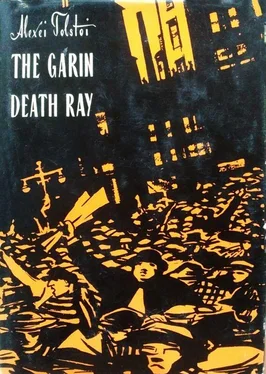
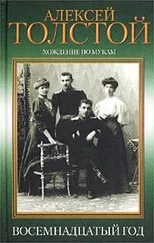

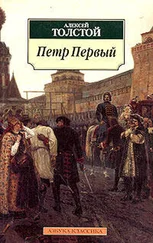
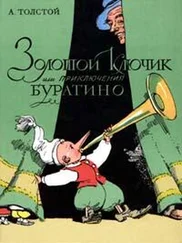
![Алексей Николаевич Толстой - Хождение по мукам [litres]](/books/26263/aleksej-nikolaevich-tolstoj-hozhdenie-po-mukam-litr-thumb.webp)
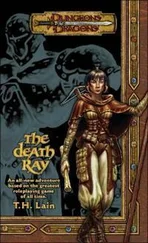

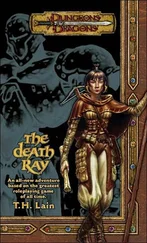


![Алексей Николаевич Толстой - Гиперболоид инженера Гарина. Аэлита [Художник Г. Зубковский]](/books/423486/aleksej-nikolaevich-tolstoj-giperboloid-inzhenera-ga-thumb.webp)
